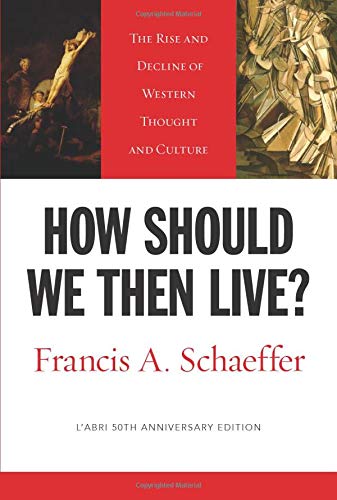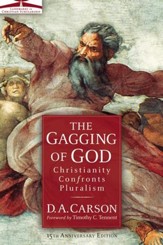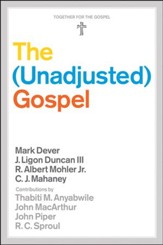Quotes about Pluralism
“All religions are basically the same”?… Hinduism’s gods are many and impersonal. Christianity’s God is one and personal. Buddhism offers no forgiveness or divine intervention. Christianity offers forgiveness and divine intervention. In Judaism and Islam men earn righteous status before God through doing good works. In Christianity men gain righteousness only by confessing their unrighteousness and being covered by Christ’s merit. Every other religion is man working his way to God. Christianity is God working His way to men.
The Grace and Truth Paradox, 2003, Used by Permission from Eternal Perspective Ministries, www.epm.org, p. 69.
We are not simply a society in which we recognize the existence of, and the differences between, a variety of religious beliefs, but one in which we declare all such beliefs are to be equally valid. From that perspective there is only one kind of heresy, namely, to claim that one view is ultimately right, where others are wrong. In granting plausibility to everything, we may grant certainty to nothing. Tolerance has been embraced at the expense of truth… To allow that everyone and everything is right is to destroy the notion of truth itself.
I’m planning to be civil toward any of my neighbors who may be heading for the local mosque. But in no way will I accept the charge that to tell them of the truth of the gospel of Jesus is to jeopardize the “pluralism” that has made America a great springboard of freedom for so many generations. And no way either will I concede the right – a right that has now become a duty – to tell them that the error of their thinking is profound. I will do that not because I hate them, but because I love them.
"Tolerance" gives me room to say, "I think you’re wrong, but I’ll defend your right to be wrong." "Pluralism" suggests, much more strongly than most folks admit, that there isn’t such thing as right and wrong – and no such thing as truth and error. As it is practiced more and more in America, pluralism tends to require that you not only leave room for your neighbor to believe what he believes, but that you also refrain from disagreeing with it. There’s a world of difference between the two perspectives. Tolerance promotes civility combined with clear thinking. Pluralism promotes civility combined with mushy-headedness.
[There is] a perverse assumption now dominant among evangelicals that feelings, attitudes and relationships are all more important than truth. Unity is a higher priority than orthodoxy. Division, even for truth’s sake, becomes the most offensive of heresies.
If any (or almost any) approach to God is as good as another, how do we make sense of the Bible’s insistence on monotheism, its consistent rejection of all forms of idolatry, and the missionary impulse — that the nations would turn to the true God — running from Genesis to Revelation? Most crucially, pluralism cannot do justice to the privileged place the Bible gives to Jesus Christ. Every knee must bow before Him. He will judge all peoples. The God of the Bible, revealed as Yahweh in the Old Testament and incarnated at Jesus Christ in the New, is nothing if not a universal God who accepts no rivals. To reject the unique person and work of Jesus Christ is to make an utter mockery of the Bible. To reject His claims is to reject God Himself and to steal from Him the glory that is rightly His. Ultimately it is to turn one’s back on the Bible and on the God of the Bible.
Jesus Christ – The Only Way and Our Only Hope by Tim Challies taken from Don’t Call it a Comeback, edited by Kevin DeYoung, copyright 2011, Crossway Books, a division of Good News Publishers, Wheaton Illinois 60187, www.crosswaybooks.org. Page 130.
It has become a commonplace to say that we live in a pluralistic society – not merely a society which is in fact plural in the variety of cultures, religions and lifestyles which it embraces, but pluralistic in the sense that this plurality is celebrated as a thing to be approved and cherished.
One of [the] chief and excruciatingly ironic effects [of the ideology of pluralism]: It silences a lot of people… So far as my observation reaches, the silenced are almost always those who if they spoke would say something characteristically…Christian. Try, for example, arguing that unrestricted permission to abort the unborn is a social and political evil at a party in Manhattan or a college town in Minnesota. Your arguments will not be rebutted; heads will merely be turned as from one who has audibly broken wind. If, on the other hand, you argue what is in fact the conventional opinion, you will be praised for courage and compassion. Or relate two conversions, one to Christianity and the other away from it; one will be received as a tale of horrid narrow-mindedness and the other as an example of an open society’s marvelous possibilities (Robert Jensen).
The God-Wars, Either/Or: The Gospel or Neopaganism, ed. Carl Braaten and Robert Jenson, Eerdmans, 1995, p. 25.
This is the mantra of religious pluralists: Liberate your mind, lose your faith, and feel the love.
Given that [the] major religions hold vastly different ideas of God, the human predicament, and the deity of Jesus Christ, a committed believer in any of these creeds could never find it acceptable even to imply that Jews, Muslims, and Christians all serve the same God.
Help the religious pluralist see that he does not really believe that all roads lead to heaven. If he did, then he would not express outrage at suicide bombings, human sacrifice, and other such practices that even staunch religious pluralists find abhorrent. One cannot consistently embrace religious pluralism and relativism and at the same time object to any religious belief or practice. If sincerity is all that matters for salvation, religious terrorists who sincerely believe their god calls them to kill others do nothing wrong when they obey him. To condemn even one religious belief is to appeal to some ultimate, normative standard by which we may evaluate religion, establishing that standard as the one, true religion – and there can be no one, true religion for the honest religious pluralist.
Religion is not a preference. Although people are allowed to hold their own opinions, they cannot make up their own truth. This cannot be done with religion any more than it can be done with mathematics. To insist that all religions are equally true is another way of saying that all religions are equally false… If every religion is compatible with its opposite, why bother with religion at all?
To believe that two contradictory religions are both true is like saying, “2+2=4, or 5, or 37, or whatever you like.” To believe all religions simultaneously is to become hopelessly entangled in self-contradiction. One simply cannot accept the Hindu belief that there are 3000,000 or more gods and at the same time accept the Muslim belief that there is only one god. Nor can one embrace either Hinduism or Islam and Buddhism because historic Buddhism does not believe in a personal God at all. Or consider the religious opinions about the afterlife. Shintoism says there is no afterlife, just the here and now, so make the most of it. Buddhists seek Nirvana, the complete absence of desire. Christianity teaches that heaven is a place where all pure desires are satisfied in Jesus Christ (Rev. 22:4). Who is right? If there is a heaven at all, does it negate or satisfy desire? Opinions about judgment differ as well. Christianity teaches that “man is destined to die once, and after that to face judgment” (Heb. 9:27). Hindus believe in a seemingly endless series of reincarnations. Well, which is it? Both views cannot be true.
[Philosophical pluralism] is the ideology that refuses to allow any single religion or worldview to claim an exclusive hold on the truth. It denies that there are any absolutes. It insists that all religions and worldviews must be seen as equally valid…To suggest otherwise is to be arrogant and intolerant. No religion can claim to be superior to any other. You may practice your faith as long as you realize it is only one of many true faiths. If what you believe is true at all, it is only relatively true… [But] at the same time that philosophical pluralism denies other religions the right to lay claim to the truth, it presents its own worldview as the absolute truth… In the end philosophical pluralism’s dismissal of dogma turns out to be just another dogma.
Although Christians cannot cherish religious pluralism, they must tolerate it… By tolerance I mean allowing other people to hold and to defend their own religious convictions. Tolerance does not mean that everyone has to agree with everyone else. That would not be tolerance at all. The word tolerance itself assumes disagreement, that there is something that must be tolerated. Tolerance thus applies to persons, but not to their errors. It does not require me to endorse your worldview. If you are not a Christian, I do not endorse your worldview. In the context of a friendship I will even try to talk you out of it… Yet it carries out these arguments with humility and civility.
There cannot be only one Mediator between man and God. There must be many according to pluralists today. It is equally a truism among pluralists that if there is one way to God, there must be many ways to God, and certainly it cannot be accepted that there is only one way. The exclusive claims of Christianity in terms of God, in terms of Christ, in terms of salvation, cannot live in peaceful coexistence with pluralists.
Built into our law system is the idea of the equal toleration under the law of all religions. It is a short step in people’s thinking from equal toleration under the law to equal validity. The principle that all religions should be treated equally under the law and have equal rights does not carry with it the necessary inference that therefore all religions are valid. Even a cursory, comparative examination of the world’s religions reveals points of radical contradiction among them, and unless one is prepared to affirm the equal truth of contradictories, one must not be able to embrace this fallacious assumption.
Indeed, it’s a misnomer to call [pluralism] a system, because it is the idea of a consistent, coherent view of truth that is unacceptable to the pluralist.
[Unbelievers] will not affirm the lordship of Christ over them because they fear that Christ will reign over them. We are fearful of affirming the lordship of Christ over all things, including our neighbors, because we are afraid of our neighbors ruling over us. Pluralism is a half-hearted attempt at a compromise of convenience – we won’t condemn you if you won’t condemn us. We won’t say you are wrong, if you won’t say that we are wrong. We won’t find your views backwards and repugnant, if you won’t find our views backwards and repugnant. What a deal? And all it costs us is the central and first affirmation of our own faith: Jesus is Lord. All we have to give up to win peace with our neighbors is the proclamation of the Gospel.
Today’s postmodernists use cultural pluralism as a pretext for relativism, as if the existence of many cultures implied the existence of many truths.














